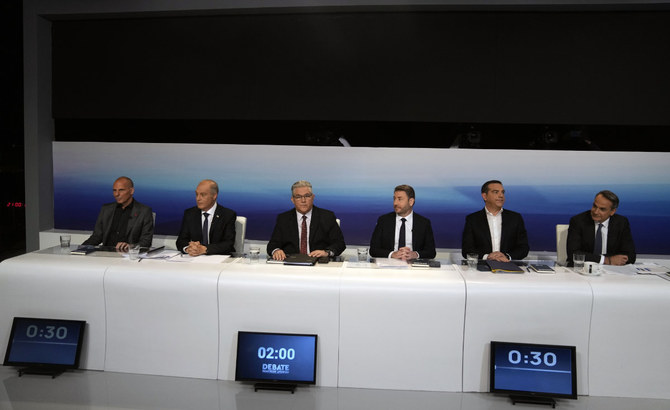ATHENS: Greece votes Sunday in a general election that could deliver a chaotic outcome, with the leading candidate, conservative Prime Minister Kyriakos Mitsotakis, unlikely to garner a lead wide enough to avoid a new vote.
The EU country goes into the polls in fairly robust economic health, with unemployment and inflation falling and growth this year projected to reach twice that of the bloc — a far cry from the throes of a crippling debt crisis a decade ago.
But economic issues remain squarely in focus even though a post-Covid tourism revival helped Greece book growth of 5.9 percent in 2022.
The outgoing prime minister has urged voters not to squander hard-fought economic stability.
But his key opponent, the former leftist premier Alexis Tsipras, has warned that the rosy hard-line figures belie growing poverty as wages fail to keep pace with rising prices.
Tsipras is seeking a comeback after a first mandate in 2015 to 2019, during which he led rocky negotiations with creditors that nearly crashed Greece out of the euro.
Close to 10 million Greeks are eligible to cast a ballot, including 440,000 first-time voters.

Opinion polls suggest that Mitsotakis enjoys a clear lead of five to seven percentage points.
But the likely outcome of the vote is unpredictable, as changes to the electoral rules mean that no party is expected to obtain an outright majority.
Whether the party that tops the polls would seek a coalition or turn to another round of votes by early July to determine who governs Greece could depend on the size of the lead it amasses.
That could spell weeks of horsetrading, with the socialist party Pasok-Kinal, led by 44-year-old Nikos Androulakis, a potential kingmaker.
Sunday’s vote marks the second national elections in which Mitsotakis, 55, a Harvard graduate and former McKinsey consultant, is pitted against Tsipras, a 48-year-old former communist and trained engineer.
The outgoing premier says he has delivered on his previous electoral promises of lower taxes, tougher immigration rules and steady growth.
“We will continue with building a new Greece,” Mitsotakis vowed at his last rally on Friday before a campaigning blackout until polls open at 7:00 am on Sunday.
But Tsipras has accused Mitsotakis of promising “better jobs and wages, only to have the middle class live on coupons.”
Cost of living and employment issues occupy many voters’ minds.
“Life, especially for young people, is very difficult. Unemployment is high, there are no work prospects and salaries vanish at the end of the month,” said Athens resident Dora Vasilopoulo, 41.
In Greece’s second-biggest city Thessaloniki, Giorgos Antonopoulos, 39, who works at a commercial store, said “salaries are used up halfway through the month and nothing is done to address this issue.
“We work just to survive.”
But Nadia Aggelopoulou, 47, a civil servant, said she believed that Mitsotakis was “doing what he can” to fight inflation.
His government “has been excellent on all levels,” she said, adding that “we don’t hear lies. We’re expecting salary hikes.”
But ahead of the vote, Mitsotakis’ government has come under pressure over the devastating head-on train collision in February that claimed 57 lives.
The government had initially blamed the accident on human error, even though Greece’s notoriously poor rail network had been suffering from years of under-investment.
The prime minister’s tough stance against immigration also came under the spotlight as The New York Times this week published footage allegedly showing Greek coast guards expelling migrants by setting them adrift in the Aegean Sea.
The images were described as “disturbing” by the UN High Commissioner for Human Rights, who also urged an independent inquiry.
A wiretap scandal that forced the resignations of the head of the intelligence service and a nephew of Mitsotakis, who was a top aide in his office, could also have an impact on the election outcome.
Androulakis, the Pasol-Kinal leader, had been seen as a potential coalition partner for Mitsotakis but chances for cooperation plunged when he discovered he had been under state surveillance.
During a visit in March by a delegation of the European Parliament’s committee on civil liberties, MEP Sophie in ‘t Veld said there were “very serious threats to the rule of law and fundamental rights” in Greece.




























